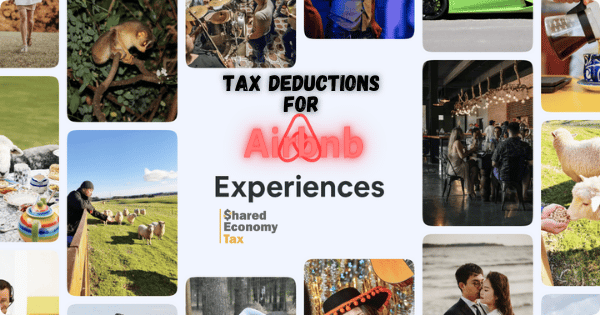Airbnb Experiences can provide hosts with a lucrative supplement to their rental earnings. Some resourceful entrepreneurs even use them to generate revenue despite not having property to rent. However, can you earn Airbnb Experience tax deductions from your expenses? We’ll explain the rules and qualifications for deducting Airbnb Experience expenses in this handy guide.
Are Airbnb Experiences Tax Deductible for Hosts?
Whether it’s paddleboarding off the coast or taking a walking tour of the NYC pizza places, Airbnb Experiences offer unique experiences for guests. Guests love taking advantage of these unique outings, and they’ve become an important part of business for hosts.
Airbnb Experiences can provide a natural supplement to hosts’ rental income. However, they also require significant resources to plan and execute. But, are expenses stemming from Airbnb experiences tax-deductible?
Airbnb experiences often overlap with the hosts hobbies. Because of this, it’s important to careful records of your customers so that you can justify the expenses associated with the excursion. We’ll take a look at which expenses can be deducted in further detail below.
What About Virtual Experiences?
Airbnb Experiences tax deductions can also come from virtual experiences. However, your expenses must directly relate to the income earned from the virtual experience.
For example, hosts offering virtual experiences should think about their computer, camera equipment, and other expenses incurred in producing and promoting the experience.
What Qualifies Airbnb Experience Expenses as Deductions?
The IRS defines a business expenses as anything that is ordinary and necessary to run your operation. By ordinary, the expense must be common in your industry. There are many expenses for Airbnb experiences that would qualify as ordinary and necessary.
Depending on the type of experience, you may be able to deduct computer equipment, camera equipment, Airbnb fees, and internet expenses.
Certain supplies may result in Airbnb Experiences tax deductions, like ingredients if you are offering a virtual cooking class. Equipment can earn deductions too, like automobile expenses for offering a virtual drive through your city.
Income and expenses from Airbnb are typically included on your Schedule C form. However, non-pass through entities like corporations usually declare these figures on their business tax return. In either case, the IRS classifies hosting expenses as above-the-line deductions.
As a business, there is no limit to the amount of expenses you can deduct against your income. You do need to make sure that your business shows a profit three out of the previous five years, otherwise the IRS will consider it a hobby.
The IRS takes lots of factors into consideration when determining business vs hobby, but profitability is typically the benchmark. If the IRS says your Airbnb is a hobby, you cannot deduct any losses to offset other income.
How Should I Categorize Airbnb Experience Expenses for Bookkeeping?
Most Airbnb’s operate as sole proprietorships which means that you are deducting your expenses on Schedule C. Schedule C includes several expense categories including advertising, wages (paid to employees), supplies, tax and licenses, utilities, and insurance. But Schedule C also allows you to included expenses that do not fit into these predefined categories on page 2 under “Other Expenses.”
Throughout the year, you should track your expenses including the date, amount, and vendor. This will make your life much easier at tax time.
Some expenses are harder than other to categorize. For example, if you buy paper to create fliers about your experience, is that an office expense or an advertising expense? The answer in this case could be either. A tax professional or bookkeeper can help you categorize your expenses correctly.
What Are Some Examples of Airbnb Experience Deductions?
Though this is not an exhaustive list, below are some Airbnb experiences tax deductions.
- Fuel costs to drive your guests to the experience location
- Gifts for guests
- City business license
- Wages paid to employees (if you have hired assistants, the amount you pay them is deductible)
- Supplies (Example: if you’re offering an art class, the art supplies would be deductible)
- Equipment (Example: for a paddleboarding experience, the paddle boards would be deductible)
- Camera equipment for filming virtual experiences
- Tax preparation fees
- Legal fees to write up waivers
- Cellphone used to communicate with guests
- Internet used for posting experience and guest communication
- Advertising and promotional expenses
- Computer equipment (if used for your experience)
What is the Best Way to Take Advantage of Airbnb Experiences Tax Deductions?
Make sure that you are tracking your expenses throughout the year. Your accountant will help you determine which expenses are deductible at the end of the year, and some of your expenses may not be deductible. It’s much hard to attempt to go back at the end of the year and hunt down every expense.
When creating an experience, consider what expenses you will incur and consider that when setting your pricing and projecting your earnings for the year.
Closing Thoughts on Tax Deductions for Airbnb Experiences
Airbnb Experience hosts are running small businesses and should remember to treat their operation as a business. This means keeping careful records of income and expenses, maintaining the records for 5 years, and ensuring that their business meets the IRS definition of a business (instead of a hobby).
Deducting your ordinary and necessary expenses can lead to big savings on your tax bill at the end of the year. Make sure you save receipts and track costs before you claim Airbnb Experiences tax deductions to stay compliant.
